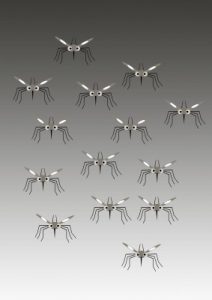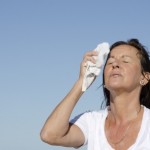
— Most commercial insect repellants contain a chemical known as DEET® and should be used with caution, and avoided, if possible. —
We have all heard that mosquito sprays contain DEET, and we have all also heard that DEET can have harmful health effects. So what do you do when mosquitos are a problem where you live?
I get it – if the mosquitos are really bad and you can’t even stay outside because you’re being attacked from all angles, you have no choice but to slather on bug repellent. So, do your best to use only what is needed for the moment, and make sure to bathe after you have come back inside.
Try this ….
When mosquitos are a problem, try everything that you can to eliminate them.
- stop their breeding by removing all stagnant water;
- swat them in mid-air;
- light candles and lanterns;
- clean up debris and cut down tall weeds;
- plant mosquito-repelling plants;
- set mosquito traps;
- if you have to spray on bug sprays with DEET, spray it on your clothing and avoid your face and your skin.
I could keep going, but these are the best and easiest steps to take on a regular basis.
Researchers have concerns that people may experience memory loss, headache, weakness, fatigue, muscle and joint pain, tremors and shortness of breath after heavy exposure to DEET.
Keep Mosquitos From Biting You

Some people attract mosquitos more than others because they produce certain chemicals in their skin. For example, lactic acid attracts mosquitos.
Researchers have evidence that Blood Type O attracts mosquitos more than Type A or B. And mosquitos use carbon dioxide levels to target where, and who, to bite.
If you are a mosquito magnet, here are some ways to keep the attraction to a minimum:
- keep mosquitos outside;
- wear light-colored clothing outdoors;
- stay indoors during dusk and dawn;
- try natural repellents before spraying DEET;
- apply natural scents such as lavender, peppermint, basil, and eucalyptus.

Keep Away From Children And Pets
In the event you choose to use DEET products, which I recommend avoiding if possible, do not use these products on infants, and avoid using them on children or near your pets.
Make sure any products for children contain 5 percent or less DEET.
Children are at risk for subtle brain changes because their skin more readily absorbs chemicals from the environment, and harmful chemicals more potently affect their developing nervous systems.
The following precautions were issued by the New York State Department of Health concerning repellents containing DEET:
— Store your repellent bottle out of the reach of children and pets, and read all instructions on the label before applying.
— Do not let children apply DEET themselves because they may put the product in their mouths or touch their eyes.
— Avoid prolonged and excessive use of DEET. Use sparingly to cover exposed skin only; do not treat unexposed skin.
— Do not apply repellents in enclosed areas. This is especially important when using sprays or aerosols.
— Do not apply directly on your face.
— I recommend spraying your clothing as opposed to your skin, but DEET can damage some synthetic fabrics and plastics.
— Wash treated skin and clothing after returning indoors.
— If you believe you are having an adverse reaction to a repellent containing DEET, wash the treated area immediately and call your physician.
Everything In Moderation

There are many ways to avoid bug repellants containing DEET, and there are safer and more natural products on the market that really do work. I use Cactus Juice – both the real cactus juice and a product called “Cactus Juice.”
The key is to always use anything and everything in moderation.
If the bugs are really bad and you have no choice but to slather on bug repellent, do your best to use only what is needed for the moment, and make sure to bathe after you have come back inside.
_____________________________
If you want to learn more about health and disease prevention, contact me at janethull.com. Remember that you are never alone when you are looking for good health!
Gain access to all of my online programs, ongoing support, monthly Q&A, and more. I look forward to supporting you on your journey to alternative health and wellness.
_____________
Disclaimer: This article is for informational purposes only, and is educational in nature. The FDA may not have evaluated some of the statements. This article is not intended to diagnose, treat, cure, or prevent any disease. Please discuss with your own, qualified health care provider before adding supplements or making any changes to your dietary program.
Before taking vitamins, consult your doctor; pre-existing medical conditions or medications you are taking can affect how your body responds to multivitamins.
You have our permission to reprint this article if you attribute us with a live back-link to this article and the youtube links. https://janethull.com/